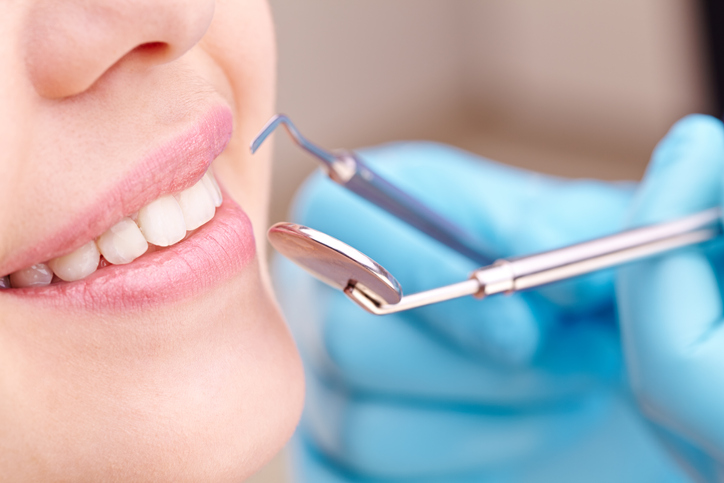
You’ve probably seen plaque scrapers sold on the Internet. Maybe you’ve asked yourself, “Should you buy one?” The answer is no, and we’ll tell you why.
Do-it-yourself may be fine for home projects, but is it right for your dental care? Although a diligent oral care regimen at home is essential for healthy teeth, some dental treatments are best left to the professionals. One of those treatments is plaque removal with a plaque scraper.
A plaque scraper is a steel instrument with two sharp hooks at each end. You may have seen them sold commercially. So, does that mean they’re safe to use at home? No, and there are several important reasons why a plaque scraper should only be operated by a trained dental hygienist.
What is Plaque?
To understand why using a plaque scraper at home is a bad idea, let’s first discuss plaque. Visible as a yellowish film on your teeth, plaque forms when bacteria builds up on the surface of your tooth. It develops above and below your gum line. As the plaque grows, the bacteria — exacerbated by surgery foods — can cause cavities and gum damage.
Plaque also leads to tartar buildup as it mixes with saliva to form hard deposits on your teeth. Tartar damages your teeth and gums because it attracts even more bacteria. It is especially difficult to remove, which is why it should only be attempted by a dental professional.
Why You Shouldn’t Use a Plaque Scraper at Home
Medical instruments like plaque scraper should only be operated by a dental hygienist who has received years of training in spotting and removing plaque and tartar. Trying to scale your teeth with a plaque scraper could lead serious dental problems, such as:
Gum Damage: Accidentally puncturing your gums with a sharp tip can cause bleeding and gum recession. There’s also a chance you may strike close to the root of the tooth, causing pain and sensitivity.
Teeth Sensitivity. Scraping away at the surface of your tooth may not clear away plaque. Instead, you may be tearing away at the enamel. With less enamel covering your teeth, your teeth will become more sensitive to hot and cold.
Infection. Improper plaque scraping can injure your gums and open up an avenue for plaque to multiply under the gum line. Eventually, an infection could grow in the gums.
Mouth Trauma. Wielding a sharp medical instrument in your mouth can harm not only your teeth and gums, but other parts of your mouth, too. Your tongue, the delicate tissues of your cheeks, and the roof of your mouth may all be damaged by the scraper if you’re not careful.
What You Can Do at Home to Prevent Plaque
You don’t need to spend money on a plaque scraper. There are some simple oral care tips you can do at home to prevent plaque and tartar from forming in the first place. All these methods, however, are in addition to your regular dental checkups and cleanings.
Brush Regularly. Brush your teeth 30 minutes after a meal, or at least twice a day. Use a soft-bristled brush and brush for two minutes. Another option is an electric toothbrush. Tilt your brush at a 45-degree angle and brush gently along the width of the tooth, front and back. Remember to brush the surface of your tongue, and brush the inside of your front teeth with up and down strokes.
Floss. At least once a day floss between your teeth to clear away any food debris. Hold the floss taut between your fingers and carefully make a C motion between your teeth, slowly going up and down, making sure not to cut into the gum.
Pick the Right Toothpaste. Fluoride toothpaste that protects against acids and decay or a tartar control toothpaste are the best options to keep plaque at bay. Toothpaste made with baking soda is another good choice. The natural cleansing properties and abrasives of baking soda can scrub teeth clean.
Use a Mouthrinse. Swirling mouthrinse and help clean hard-to-reach places. In addition, rinsing your mouth with olive or coconut oil is said to remove plaque, heal sore gums, and prevent tooth decay.
Skip the Sweets. Sugar contributes to plaque growth. Instead, munch on raw vegetables to help clean your teeth.
Visit Your Dentist for a Tooth Cleaning
At-home dental care is an important part of maintaining your oral health. But plaque removal should only be done by a dental professional during your semi-annual oral exam and cleaning. The dentists and staff at Espire Dental in Oklahoma City have years of experience in servicing your dental needs. Contact our office today for an appointment.
